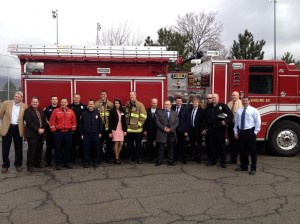
Orem City management met with four Russian delegates to discuss local governmental policy.
The delegates from the Ryazan region, the Russian equivalent to a state, are visiting Utah as part of the Open World program. Open World is run by the Library of Congress and invites government representatives from former Soviet nations to come and learn about national and local government in the U.S.
The delegates include Denis Aleksandrovich Bokov, deputy director, Ryazan Region Department of Youth Development, Physical Fitness & Sports; Vladislav Viktorovich Frolov, deputy, Ryazan City Council; Gleb Dmitriyevich Kondratyev, staff assistant, Ryazan Region Legislature; and Yevgeniya Vladimirovna Kudasheva, fourth-year student, Moscow Institute of Law and Public Administration, Ryazan City.
The delegates said they were most interested in learning about public safety and the Orem Parks and Recreation department.
Orem’s police department is funded and run by the city, similar to many other U.S. cities. In Russia it is a federal type of agency that is independent of all other agencies. The delegates explained that the police interact with the city and regions but do not report to them. They said the idea is to separate local government and law enforcement.
Bokov said the Russian model eliminates possibility for corruption. He asked Jamie Davidson, Orem City manager, if there is corruption in Orem’s police department.
“It’s important we maintain public trust. If there is something wrong, we act on it immediately,” Davidson said.
Inquiries included ethnic and juvenile crime in Orem. Ned Jackson, Orem Police captain, said Orem’s crime rate is low. Their biggest struggle, he said, is creating trust among citizens who come from countries where they fear the police.
The delegates were surprised that Orem has as few public parks as it does and that the city charges for usage of community recreation centers.
Frolov, who also manages an ice rink in Ryazan, said in the past 10 years they have built 16 large facilities that have swimming pools, basketball and vollyeball courts and playgrounds. They have also built an ice palace and 18 tennis courts. By Russian law, all facilities must be free to youth (in Russia, ages 14–30) from 8 a.m. to 8 p.m.
All facilities are paid for by taxes, and all rec. centers require a membership fee to provide staff and up-keep in Orem. In Russia, the federal government provides funds to subsidize costs for the building and management of sport facilities.
“Information sharing is always great,” said Brenn Bybee, assistant Orem City manager. “Hopefully it helps them and shows we are trying to promote openness.”
The delegates toured Orem’s public safety building and got to sit in the firetruck, sit on a police motorcycle and meet Pongo, the police dog, after the meeting.
The delegates spent two days in Washington, D.C., learning about U.S. federal government, and visited Lehi, Provo and Orem to learn about local government. They will spend Wednesday at the state Capitol meeting with Utah representatives.




